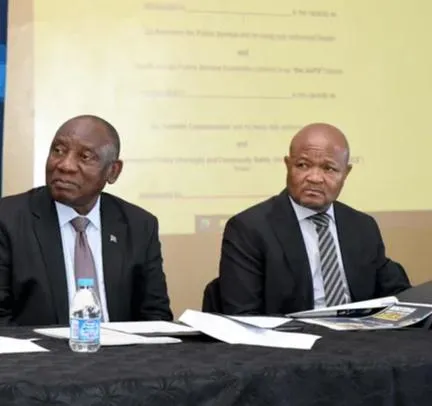Political interference in SAPS: Experts weigh in ahead of Ramaphosa's address

South Africans await to hear President Cyril Ramaphosa's views and decision about Police Minister Senzo Mchunu amid corruption allegations.
Image: File
As the nation awaits President Cyril Ramaphosa’s address on Sunday evening regarding serious allegations of political interference and corruption within the South African Police Service (SAPS), concerns about the integrity of law enforcement and governance continue to deepen.
The president’s forthcoming speech follows a dramatic public statement on July 6 by KwaZulu-Natal Police Commissioner Lieutenant General Nhlanhla Mkhwanazi, who revealed allegations implicating senior political figures, including Minister Senzo Mchunu and police officials, in systemic corruption and manipulation.
Ramaphosa, having been at the BRICS Summit in Brazil when the allegations emerged, promised to act decisively upon his return.
Experts say the situation reflects longstanding challenges within the SAPS and the broader justice system.
Dr Simon Howell of the University of Cape Town’s Centre of Criminology explained that while such public accusations at the national level are uncommon, “within the organisation, there may be lots of people talking about things”.
He stressed the importance of thorough inquiry: “Credibility depends on who’s making the statement, the reasons, and the evidence they can show. Considering the allegations made, there will need to be some type of inquiry.”
Howell highlights the damaging effects of political interference on crime investigation.
“There have been recorded instances of political interference having a significant impact,” he noted, recalling the firing of Robert McBride from the Independent Police Investigative Directorate after he pursued allegations against senior officers.
“Political interference is a distraction from operational policing… it undermines police resources and public focus on the issues that should matter.”
The constitutional design intended to separate political oversight from operational policing has, according to Howell, been eroded over time.
“The distinctions between the police minister and the commissioner have become very blurred. So long as those boundaries remain unclear, there are significant issues. The president needs to take firm leadership to restore and strengthen these boundaries.”
On oversight bodies, Howell observed that the Independent Police Investigative Directorate (IPID) has become “often toothless”, lacking the power to conduct meaningful investigations.
He pointed to recent successes by the Ministerial Police Agency (MPA) but insisted that reform is critical if public trust is to be rebuilt.
The backlog of investigations, Howell added, not only damages public confidence but also corrodes police morale and discipline.
“Imagine working in an organisation where bosses are constantly under investigation or arresting one another. This has a severe effect on policing. Clear guidance and leadership are essential.”
Political analyst Professor Sipho Seepe described the allegations as “dire”, warning that they pose a fundamental challenge to the African National Congress and the entire criminal justice system.
He condemned the ANC’s handling of the Phala Phala scandal, particularly the classification of the report as top secret by Mchunu, who now faces accusations from Mkhwanazi of interference in policing operations.
Seepe said: “Phala Phala has already compromised Ramaphosa’s standing. He is the last person to talk about the fight against corruption.”
He called for the consistent application of the rule of law, including the removal of those implicated in corruption from positions of power.
Legal expert Dr Lennit Max, a former police advisor, warned of serious consequences if Mchunu is found to have misled Parliament or interfered in police matters.
“The minister can be reported to Parliament’s Ethics Committee for misleading the House, and a criminal case for perjury may be opened. If convicted, he could face jail, a suspended sentence, or a fine.”
Max pointed to precedents set by the convictions of former national commissioner Jackie Selebi and ex-head of Crime Intelligence Lieutenant General Richard Mdluli, emphasising that “no one is above the law”.
He suggested the president may appoint an independent judge or commission to investigate the allegations and systemic failings within the SAPS.
Meanwhile, businessman Brown Mogotsi, named by Mkhwanazi as connected to the controversy, denied any improper relationship with Mchunu or influence over the SAPS.
In a TV interview, Mogotsi said he was not a police officer and held no formal role within the service.
He claimed that he had phoned Mkhwanazi days before the media briefing to discuss fears among officers about arrests under Section J50.
Mogotsi rejected claims that he arranged meetings with businessman Vusimuzi 'Cat' Matlala on the minister’s behalf or benefited from SAPS tenders, saying: “Ministers don’t run tenders. I’ve never done that, consciously or unconsciously.”
He also denied any familial or professional ties to the minister’s spokesperson and expressed concern for his safety after receiving threats.
Mkhwanazi revealed that Mogotsi first contacted him via WhatsApp in September 2024, warning of attempts to discredit the police commissioner through legal manipulation.
The messages included sensitive police documents and raised questions about the extent to which outsiders interfere in operational policing.
The allegations have sparked political fallout, with the MK Party’s Deputy President, Dr Mandlakayise John Hlophe, calling on Ramaphosa to dismiss Mchunu within 48 hours, reinstate the disbanded Political Killings Task Team, and establish a judicial commission of inquiry.
“The minister’s alleged interference in SAPS operations and connections to corruption have rendered his position untenable,” Hlophe wrote. “His continued tenure undermines the credibility of your administration and the fight against organised crime.”
He warned that failure to act would leave the MK Party no choice but to pursue all available mechanisms of accountability, including parliamentary oversight, legal action, and mass mobilisation.
“The Constitution enjoins you, Mr President, to act in the best interests of the Republic. The time to act is now.”